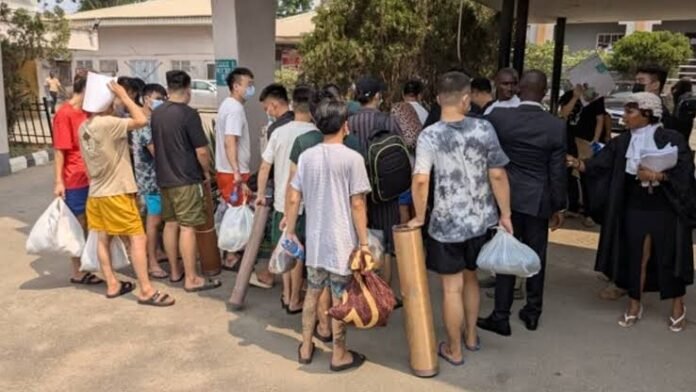The Nigerian Immigration Service (NIS) on Sunday began deporting 42 Chinese and Philippine nationals convicted of cybercrime and Ponzi scheme offences.
They are the first batch of 192 foreigners ordered out of the country. The group left Lagos aboard a repatriation flight at 2:00 p.m.
Officials said deportations will continue in phases on Monday and Tuesday until all the convicts are returned to their home countries.
The deportees were part of 759 people arrested on December 10, 2024, during a major raid at Oyin Jolayemi Street, Victoria Island, Lagos.
Investigators revealed that the group ran a large-scale cyber fraud network and operated an illegal Ponzi scheme targeting unsuspecting investors.
All the convicted foreigners were later transferred to the NIS for deportation after prosecution by the Economic and Financial Crimes Commission.
A senior NIS officer at Murtala Muhammed International Airport said the operation was kept low-key for security reasons. “We cannot allow foreigners to commit crimes in our country and have Nigerians take the blame for their actions,” he explained.
EFCC: A Turning Point in Anti-Corruption
The EFCC chairman, Ola Olukoyede, praised the move as a major step in the fight against cybercrime.
“These convictions send a strong signal that Nigeria will not serve as a haven for cybercriminals,” he said. “The commission remains committed to recovering stolen funds and restoring national dignity in line with President Bola Tinubu’s anti-corruption drive.”
According to the EFCC, the charges included the use of false identities to defraud victims, training employees of Genting International Co. Limited in fraudulent practices, and other crimes under the Advance Fee Fraud Act of 2006.
“These offences were calculated to undermine Nigeria’s security and financial integrity. Their successful prosecution represents a turning point in the fight against transnational financial crimes,” Olukoyede added.
The December raid, one of Nigeria’s largest cybercrime crackdowns, has been described as a defining moment in safeguarding the nation’s financial system.
How did such large-scale operations with many foreign nationals take hold in Nigeria, and how can the deported convicts or others be prevented from returning? Readers are invited to share their views in the comments.Rate, Like 👍, Comment💬, share this article, Follow us on our social media handles, and Submit your own story to get featured and earn rewards!







